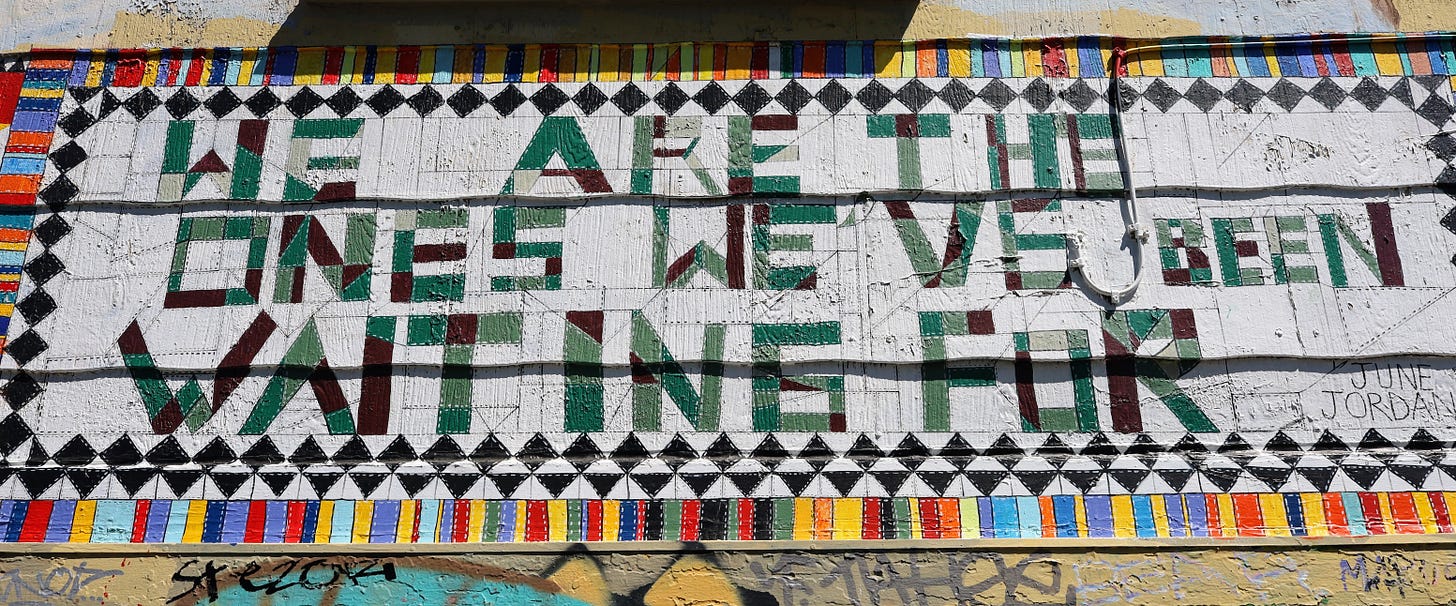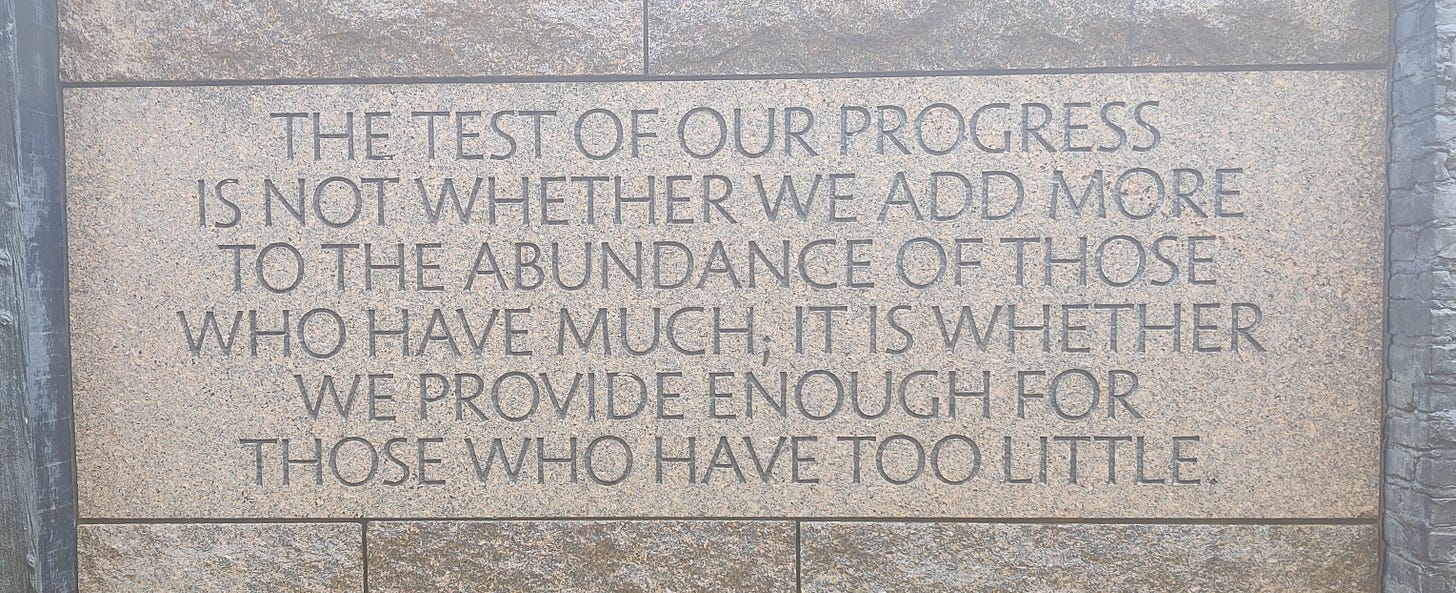Fighting Back
The continuing battle for accountability and against political inaction
You’ve probably seen news of an “imminent” famine in Gaza, where 1.1 million people (half of the population) is experiencing “catastrophic” hunger. This is based on a new UN-backed report which warned of a famine between now and May.
Hostilities and restricted humanitarian access are “key drivers”, according to the report.
Two days later, the U.N. food and agriculture agency warned that ongoing conflict and lack of assistance could also push almost 5 million Sudanese to “catastrophic” levels of hunger.
I’ve said this before to anyone who would listen and I’ll say it again: modern-day hunger is a result of political failure and neglect. In this day and age, it is unacceptable to have populations going without food, let alone on the verge of starvation and death.
We have enough food to feed the world. But some people can’t get to this food (or food can’t get to these populations) and/or they can’t afford it. These are political decisions and inhumane ones at that.
I’ve seen this happen in my own country, where official incompetence and discrimination are the main causes of hunger and malnutrition.
Still, after two issues focusing on bad news, I’ve decided to turn my attention to some of the more inspirational things that are happening and only mention in passing the UN’s State of Global Climate report, which pretty much repeats all the warnings we’ve been hearing.
I hope you will finish this issue feeling energised and raring to change the things that need changing, instead of feeling despondent at how horrible things are.
Total, Recalled
On Mar 13, Belgian livestock farmer Hugues Falys filed a lawsuit against TotalEnergies for its role in climate change. The legal action, filed at the Tournai Commercial Court on the border with France, is said to be “the first climate case ever brought in Belgium against a multinational company”.
Three Belgian non-governmental organisations - FIAN, Greenpeace, and the Ligue des droits humains (LDH) - are helping Hugues with “The Farmer Case”, which has three key objectives: recognition for the damages suffered by the farmer, forcing the fossil fuel giant to implement “a credible transition plan” away from oil and gas including a 47% reduction in production, and for the industry to be held accountable for the harms it has caused.
Strategic lawsuits against climate change culprits are becoming more and more common as people turn to the courts to force bad actors to clean up their acts.
There are now a total of 2,593 climate litigation cases all over the world, with the U.S. accounting for about two thirds, data from Columbia University's Sabin Center for Climate Change showed. These include lawsuits against governments, corporations, and individuals, usually for failing to tackle the climate crisis.
In fact, in the five years between 2017 and the end of 2022, the total number of climate change cases more than doubled, according to a report published last July by the UN Environment Programme and the Sabin Center.
“Climate change litigation provides civil society, individuals and others with one possible avenue to address inadequate responses by governments and the private sector to the climate crisis,” it added.
This case in Belgium is all the more interesting because of the farmers’ protests occurring across Europe and the divisive and simplistic narratives that have emerged about farmers and their attitudes towards the environment. I’ve written about this ad nauseam but if you’re a new subscriber, here’s a recent issue that touches on this topic.
Hugues has been a farmer for more than 30 years. His 75-hectare farm in Hainaut province in Wallonia has about 100 cows. He also grows cereals, protein crops, vegetables, and strawberries.
Wallonia is a region in southern Belgium that borders France, Luxembourg and Germany. It is also where a recent survey of 300 farmers found 8 out of 10 are experiencing difficulties arising from climate change.
An agricultural engineer who cares for the environment, Hugues decided to transition to sustainable agriculture over the years. His meat production has been labelled organic since 2017, he told me via e-mail.
“At the heart of my farming system is what we call in French “l’autonomie fourragère” (forage autonomy). I work with an extensive self-sufficient grass-rearing system, which means that my cows are fed exclusively with grass from my meadows and legumes (alfalfa, clover, etc.) produced on my farm. I do not import feed from overseas, such as soy from Latin America, as is often the case with conventional farms.”
But climate change waits for no man, and Hugues, like many farmers, has been affected by erratic weather patterns. Not only have they reduced the yields of his cash crops, they also forced him to reduce the size of his herd.
I asked him about the challenges he faced, the court case, and his thoughts on the protests. I’ve lightly edited his responses.
Q: Can you tell me briefly about the losses you’ve suffered (both monetary and non-monetary) as a result of climate change?
A: Extreme weather events, in particular heatwaves, droughts, and extreme rainfall, have had a severe impact on my farm’s yields in recent years.
In 2016 a severe stationary storm hit my farm, destroying my strawberry and potato crops.
In 2018, 2020 and 2022, we suffered heatwaves and droughts during summertime. We had heatwaves and droughts in the past. But not with this frequency and intensity. Those have had a huge impact on the productivity of my meadows and legume crops.
The grass stopped growing, forcing me to buy feed elsewhere for my cows. And because of those recurring weather events I had to reduce my herd by a third to adapt to a new reality: forage production is decreasing.
The exact economic damage this represents is currently being assessed.
In non-monetary terms, this also means extra time and extra work. Cows usually graze on meadow grass. During those heatwaves, I had to buy fodder elsewhere to feed my cows. It’s time-consuming, in terms of transportation. At least one to two extra hours of work per day.
The psychological aspect is also important. Stress and anxiety, provoked by uncertainty and having to adapt to new conditions have a big impact on my life. Nowadays we don’t know when we have to sow or harvest our crops anymore…
Q: Why Total and not other fossil fuel giants?
A: We have chosen TotalEnergies for several reasons:
TotalEnergies has a strong presence in Belgium, being the leading refiner and distributor in the country. It also has historical links with Belgium because the company took over the former Belgian oil company Petrofina in 1999.
Most of all, TotalEnergies is one of the top polluting companies, on a global scale. The French group is one of the top 20 “Carbon Majors” that are responsible for over a third of global greenhouse gas emissions.
Please have a look at our website for more sourced pieces of information about TotalEnergies’ impact, both globally and locally.
Q: Farmer protests in Europe over the past two months have been portrayed as “anti-green backlash”. What are your views? Are you the odd one out (or) are there more farmers like you who are just too busy to protest?
A: Indeed the media portrayed the farmer protests in Europe and in Belgium as anti-environmental. And this is partly true. But this is not the whole story.
I think the great majority of the farmers were not protesting against environmental measures, but mostly for decent incomes and less administrative burdens. But the only response Europe has been able to come up with is a step backwards in green regulations.
I think it's mainly influenced by the big conventional farming and agribusiness lobbies like the Copa-Cogeca. This is a disaster because it will only worsen climate and environmental breakdown in the future.
But there is another voice in the peasant movement. I’m actually an active member of a progressive farmer union in Wallonia, called FUGEA. It is part of the international peasant movement La Via Campesina. We were also demonstrating in the streets those last weeks. And our demands are clear: we don’t want less environmental measures. We want decent incomes and adequate means to transition towards agroecological ways of farming.
So I’m clearly not the only one. But unfortunately we seem not to be heard by the political elite.
Q: What would your response be to critics who said you’re just a front for environmentalists who want to destroy farming/food security in Europe?
A: Honestly, I don’t know if I want to get into this debate which tries to oppose environmentalists and farmers. It makes no sense to me.
As farmers we need healthy soils, a healthy environment and a stable climate. We are the first (to be) affected by climate and environmental breakdown and we need to adapt to it. So the transition to sustainable agriculture and agroecology is essential for us and for society.
But what is also clear is that currently it is extremely difficult for farmers to make this transition a success. The international trade system is simply unfair, and is gradually destroying small-scale peasant farming. In Belgium we have lost 70% of our farms since 1980. Can you believe it?
I think as a society we need to start realising that we need farmers to ensure our food sovereignty in Europe. And that farmers need decent incomes to live on and adequate means to produce healthy food and care for nature.
The Commission, Notice Given
Among a list of European agricultural policies that went awry last year was the promise to reform animal welfare, which included a plan to ban the use of cages in animal farming following a very successful citizen-led initiative that amassed nearly one and a half million signatures calling for an end to this practice.
If you want more background on what happened, read the investigation we at Lighthouse Reports did into lobbying efforts by an increasingly assertive meat industry with media outlets including The Guardian, EU Scream, and Food Unfolded.
Well, on Mar 18, the Citizens’ Committee of the “End the Cage Age” European Citizens’ Initiative (ECI) filed its case at the European Court of Justice.
I asked Olga Kikou, head of Compassion in World Farming EU, which is funding the legal action, about the case, the process involved, and why this is “ground-breaking”.
The reason
This is “the only ECI that received a clear, binding commitment by the Commission to put forward a legislative proposal to ban caged farming by the end of 2023” but the Commission failed to do this, Olga said.
“There are over 130 ECIs that have been registered so far. Ten of them have surpassed the threshold of 1 million valid signatures and only one has received a clearly positive commitment by the Commission to fulfil all the ECI asks.”
“There is a legal requirement for the Commission to publish a timeline for an ECI - there is no justification for further delay. All the relevant reports and preparations had already been completed before the Commission abruptly shelved the proposals to reform animal welfare legislation, which included a ban on cages.”
The aims
To compel the European Commission to publish its legislative on this proposals within a clear and reasonable timescale.
“We are also asking the Court to urge the Commission to provide access to its files on the ECI so that we can learn more about the decision to delay the animal welfare proposals, especially about the proposal to ban cages – so far access to that file has been refused,” added Olga.
The process
Only the Citizens’ Committee that organised the successful ECI has the ability to launch this action, Olga told me.
“Third parties with a concrete interest in the outcome of the case can also join the case as intervenors, first putting in a request to the court and then, if accepted, presenting opinions in favour of the case,” she said.
“The Court action may take up to 16-18 months to come to a conclusion but we hope it will be resolved as quickly as possible to avoid any further delays by the Commission to bring forward the legislation.”
The groundbreaking nature
“It is the first lawsuit ever filed to hold the Commission accountable over its failure to act on an ECI. Secondly, no one before has ever asked for access to the files related to any ECI.”
“This lawsuit has not only the potential to make a difference for the over 300 million animals who suffer in cages across the EU, but can also significantly help the ECI instrument as a whole by preventing the further weakening of this participatory democracy tool.”
What’s next?
“Now that the legal action has been filed, there will be an opportunity for the Citizens’ Committee to request an oral hearing before the court. This will provide an opportunity for both sides to present their arguments at a public hearing at the Court of Justice in Luxembourg.”
“We very much welcome this opportunity to publicly demonstrate the need for the European Commission to deliver on its commitment to ban cages without further delay.”
The Fellowship, Offered
Lighthouse Reports is launching a new fellowship programme for three paid, part-time positions in the OSINT, data, and reporting teams.
You don’t have to be trained journalists to apply, but you do need to understand and be committed to the principles of investigative journalism.
Deadline is April 8. Check out more info here.
There are also Zoom meetings next Monday (Mar 25) for prospective applicants who have questions. For the 10am CET meet, register here. For 1400 CET, register here.
Thin’s Pickings
Reverse EU’s growing greenlash - Science
Editorial by Guillaume Chapron on the European Commission’s capitulation on environmental policies in light of the farmers’ protests and how the appeasement will not help Europe in the long term. The whole piece is a gem.
”Grievances about costs, regulations, and bureaucracy by any economic sector are not surprising. However, the speed at which EU and national politicians abandoned green policies reflects the strong penetration of industrial agriculture into decision spheres. Such capture of government by an interest group is dangerous.” (THIN: YES, YES, YES!)
”Economic hardship for farmers is neither caused by a lack of consideration by politicians nor by environmental policies but rather by an agro-political system that, regardless of evidence-based policies, is tightly controlled by those who benefit from it. How will this economic sector become sustainable if those controlling it uphold a business model that is incompatible with sustainability?”
The Desk Dispatch: Seeking Gustu in La Paz - From the Desk of Alicia Kennedy
Hilary Landa’s lovely, thoughtful piece is about a trap many of us who call ourselves foodies have fallen into, at least once.
No Rest (Water, or Shade) for the Weary - Ambrook Research
Emma Glassman-Hughes on Florida’s Republican-led Senate voting to kill local heat protection ordinances that would have penalised employers who don’t provide water and rest breaks to workers.
This, despite Florida being the hottest state in the U.S. and having an estimated 2 million outdoor workers, including farm labour.Smoke and Lies - The Border Chronicle
This isn’t related to food or climate, but this issue, based on a newly-released visual investigation into how 40 men died at a temporary migrant detention facility in Ciudad Juárez, Mexico, last year, is well worth a read.
Kudos to my Lighthouse colleague Melissa, her team, and the Mexican media partners for their work.
As always, please feel free to share this post and send tips and thoughts on mastodon @ThinInk@journa.host, my LinkedIn page, twitter @thinink, or via e-mail thin@thin-ink.net.








